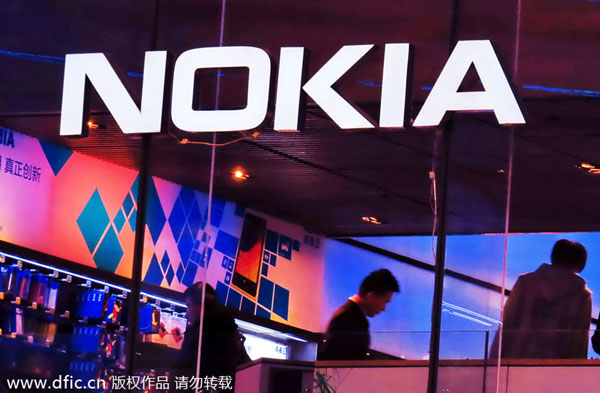Nokia declares new future despite profit loss
(Xinhua) Updated: 2015-05-06 09:40
 |
|
Customers walk past the logo of Nokia at a store in Shanghai, Feb 20, 2013. [Photo/IC] |
HELSINKI - The messages coming out of Nokia's annual meeting on Tuesday showed confidence that the company would become a global leader in communication networks after purchasing Alcatel-Lucent.
At the meeting, company board chairman Risto Siilasmaa said wireless and traditional networks would begin merging and with the recent transaction, Nokia would be able to benefit from the trend.
"Following the Alcatel-Lucent purchase, Nokia is the only actor on the international scene that meets the new demands globally," Siilasmaa said.
Nokia is paying dividends 14 cents per share. It is a decline from 37 cents last year when the dividend was 11 cents and an additional 26-cent per share was paid. By contrast, in 2013, Nokia paid nothing to its shareholders.
Nokia believes Internet operators will, in the future, offer their clients a single subscription that covers all use of networks. "Usage of technology will be replaced by an entity of services," Siilasmaa noted.
Nokia CEO Rajeev Suri said that Nokia aims at being the leader "in all areas where it attempts at being a competitor."
Currently, Nokia comprises units of networks, technological patents, and the mapping and location service, Here.
Last week, Nokia dismissed reports that it would re-enter the mobile handset business.
Here has been reportedly for sale, but comments at the annual meeting cautioned that alternatives were open. Siilasmaa told the meeting that current considerations may not lead to a transaction but that Nokia has confidence in the potential of Here, should it remain Nokia's service.
The demand for maps in the automotive sector will increase in the future, and as a result, the map sector has huge potential. Analysts have noted that sale could be justified nevertheless on the grounds that Here is a different type of business from the rest of current Nokia.
Suri said Here could be sold as one entity or it could be split and part of it could remain within Nokia.
Results of the first quarter of 2015 indicated the profitability of Nokia's network business had declined. Analysts have said competition had been reflected in lower price levels, particularly in China.
- Speculation driving up soccer-related stocks
- Shenyang finance executive summit opens
- Chinese auto giant announces new chairman
- Alibaba vows to slash prices of wine imports via e-commerce mode
- China should strive for higher than 7% economic growth: Justin Yifu Lin
- China Daily's website takes top spot in readership
- 'Makers' securing place as China's new economic drivers
- Chinese VP meets US-China business council members
















